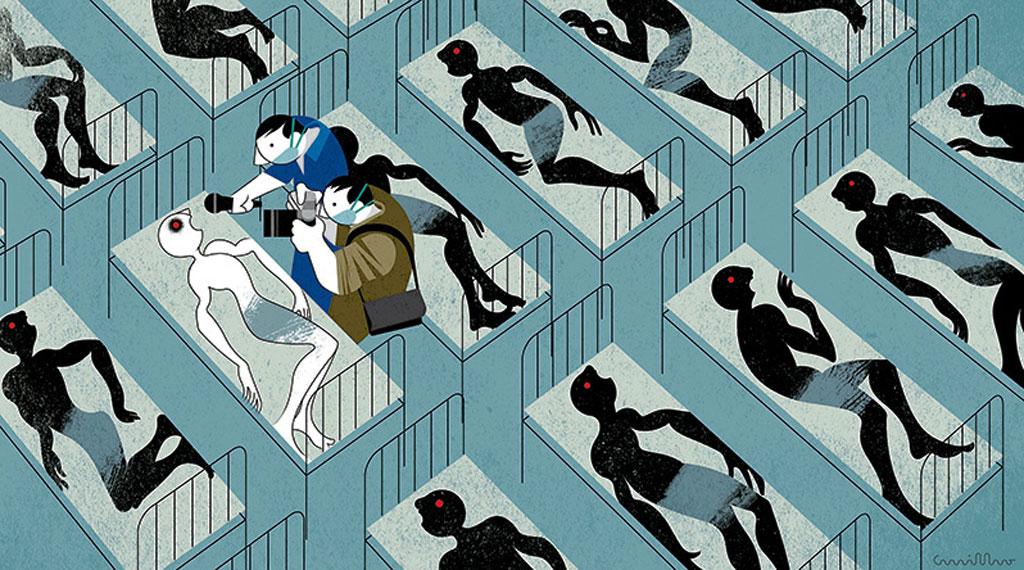Ebola timeline
November 7, 2014
Ebola hemorrhagic fever is a disease caused by one of five different Ebola viruses that is extremely infectious but not extremely contagious. It is infectious because an infinitesimally small amount can cause illness. The first human outbreaks occurred in 1976, one in northern Zaire in Central Africa and the other in southern Sudan. The virus is named after the Ebola River, where the virus was first recognized in 1976, according to the Centers for Disease Control and Prevention. Ebola could be considered moderately contagious because the virus is not transmitted through the air. Humans can contract the virus by other humans if they come in contact with body fluids from an infected person or contaminated objects from infected persons. According to the World Health Organization, “There is no specific treatment or vaccine.”
The fatality rate can be up to 90%. Patients have been given supportive care, which has included providing fluids and electrolytes and food.
The Start
1976 – First recognition of the EBOV disease was in Zaire. The outbreak had 318 reported human cases, leading to 280 deaths. A Sudan Virus (SUDV) outbreak also occurred in Sudan, which incurred 284 cases and 151 deaths.
2014 Outbreaks
Cases of Ebola as of November 2, 2014 (World Health Organization and CDC):
Guinea – 1731 cases, 1041 deaths
Liberia – 6525 cases, 2697 deaths
Mali – 1 case, 1 death (infection originated in Guinea)
Nigeria – 20 cases, 8 deaths
Senegal – 1 case, 0 deaths (infection originated in Guinea)
Sierra Leone – 4759 cases, 1070 deaths
Spain – 1 case, 0 deaths
March Event
March 25, 2014 – The CDC issued its initial announcement on an outbreak in Guinea and reported of cases in Liberia and Sierra Leone. In Guinea, a total of 86 suspected cases, including 59 deaths (case fatality ratio: 68.5%), had been reported as of March 24, 2014. Preliminary results from the Pasteur Institute in Lyon, France suggested Zaire ebola virus as the causative agent.
August Events
August 2, 2014 – A specially equipped medical plane carrying Ebola patient Dr. Kent Brantly landed at Dobbins Air Reserve Base in Marietta, Georgia. He was then driven by ambulance to Emory University Hospital in Atlanta.
August 8, 2014 – Experts at the World Health Organization declared the Ebola epidemic ravaging West Africa an international health emergency that required a coordinated global approach, describing it as the worst outbreak in the four-decade history of tracking the disease.
August 21, 2014 – Dr. Kent Brantly was discharged from Emory University Hospital. It was also announced that Nancy Writebol had been released on Tuesday, August 19. The releases came after Emory staff were confident Brantly and Writebol posed “no public health threat.”
September Event
September 16, 2014 – President Barack Obama called the efforts to combat the Ebola outbreak centered in West Africa “the largest international response in the history of the CDC.” Speaking from the CDC headquarters in Atlanta, Obama added that “faced with this outbreak, the world is looking to” the United States to lead international efforts to combat the virus. He said the United States has been ready to take on that leadership role.
October Events
October 1, 2014 – Liberian government officials released the name of the first diagnosed case of Ebola in the United States: Thomas Eric Duncan.
October 6, 2014 – A nurse’s assistant in Spain became the first person known to have contracted Ebola outside Africa in the current outbreak. The woman helped treat two Spanish missionaries, both of whom had contracted Ebola in West Africa, one in Liberia and the other in Sierra Leone. Both died after returning to Spain. On October 19, Spain’s Special Ebola Committee said that nurse’s aide Teresa Romero Ramos was considered free of the Ebola virus.
October 8, 2014 – Thomas Eric Duncan died of Ebola in Dallas.
October 11, 2014 – Nina Pham, a Dallas nurse who cared for the now-deceased Ebola patient Thomas Eric Duncan, tested positive for Ebola during a preliminary blood test. She was the first person to contract Ebola on American soil.
October 15, 2014 – Amber Vinson, a second Dallas nurse who also cared for Thomas Eric Duncan, was diagnosed with Ebola. Authorities said Vinson flew on a commercial jet from Cleveland to Dallas days before testing positive for Ebola.
October 24, 2014 – The National Institutes of Health announced one of the Dallas nurses, Nina Pham, has been declared free of the Ebola virus. Doctors at Emory University Hospital said tests no longer detect the virus in the blood of the other nurse, Amber Vinson. Pham was released from a Maryland hospital on October 24, and Vinson was released from an Atlanta hospital on October 28.
October 24, 2014 – In response to the New York Ebola case, the governors of New York and New Jersey announced that their states were stepping up airport screening beyond federal requirements for travelers from West Africa. The new protocol mandated a quarantine for any individual, including medical personnel, who has had direct contact with individuals infected with Ebola while in Liberia, Sierra Leone or Guinea. The policy allowed the states to determine hospitalization or quarantine for up to 21 days for other travelers from affected countries.
